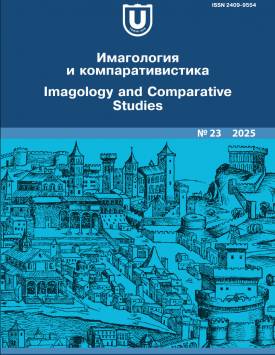The Russian-European utopian dialogue: From folk traditions to 19th-century modernization practices
The article studies the intellectual history of the Russian utopia from folk texts to the works of the first half of the 19th century in the context of the dialogue with Western European tradition. For the first time, the Russian utopia has been considered through the prism of modernization, which first emerged in the texts of the first half of the 19th century. The author analyzes folk utopias about “the returning savior” and “faraway lands”, Mikhail Shcherbatov’s unfinished novel The Journey of Mr S., a Swedish Nobleman, to the Land of Ophir, and three Russian utopias (A Dream by Aleksandr D. Ulybyshev, Plausible Fantasies or a Journey in the 29th Century by Faddei V. Bulgarin, The Year 4338: Petersburg Letters by Vladimir F. Odoevsky) in their dialogue with Memoirs of the Year Two Thousand Five Hundred by Louis-Sebastien Mercier to demonstrate how Western European utopias influenced the ideas of modernization in Russian utopias. Using methods of intellectual history, the author studies utopias synchronically and diachronically in the historical context and through intertextual connections. The interaction of the Russian and Western European utopian traditions has so far been the subject of only peripheral studies in the works by Natalia Kovtun, Valerii Mildon, and Olga Pavlova. The author aims to establish the evolution vector of the Russian utopia, which consistently shifted from the denial of possible modernization of Russia in folk texts to specific chronotope organization in speculative fiction, thus implying a movement from the discursive to practical form of reflection on the country’s future. While folk utopias show Russia as a place where transformations appear impossibe, Shcherbatov “encoded” Russia as Ophir. Though the three Russian utopias under analysis (by Ulybyshev, Bulgarin, and Odoevsky) reveal Mercier’s obvious influence, they demonstrate a marked tendency for an idealized Russia, which is not the case in Mercier’s ficiton. The author argues that the concretization of the chronotope in Russian utopias was influenced by the Western European tradition and modernization practices (Thomas More, Francis Bacon, Louis-Sebastien Mercier); however, the specificity of the Russian utopia was in its implicit criticism of the Western European modernization combined with an appeal to its experience, so that the technological and scientific development becomes a substitute for social modernization. The author declares no conflicts of interests.
Keywords
utopia, Russian-European dialogue, modernization, Mikhail M. Shcherbatov, Louis-Sebastien Mercier, Aleksandr D. Ulybyshev, Faddei V. Bulgarin, Vladimir F. OdoevskyAuthors
| Name | Organization | |
| Grigorovskaya Anastasya V. | Higher School of Economics University | agrigorovskaya8@gmail.com |
References

The Russian-European utopian dialogue: From folk traditions to 19th-century modernization practices | Imagologiya i komparativistika – Imagology and Comparative Studies. 2025. № 23. DOI: 10.17223/24099554/23/2
